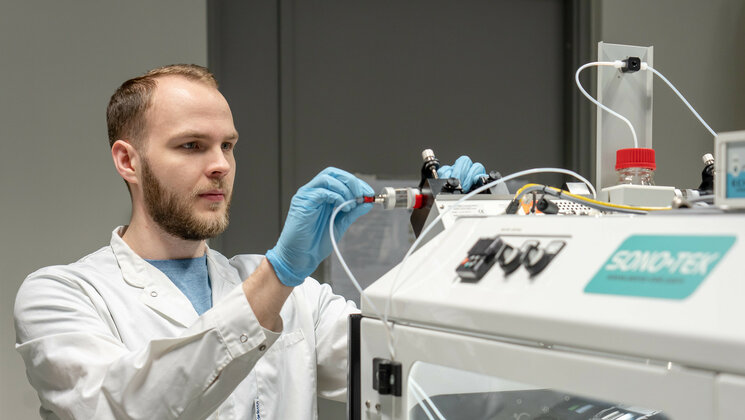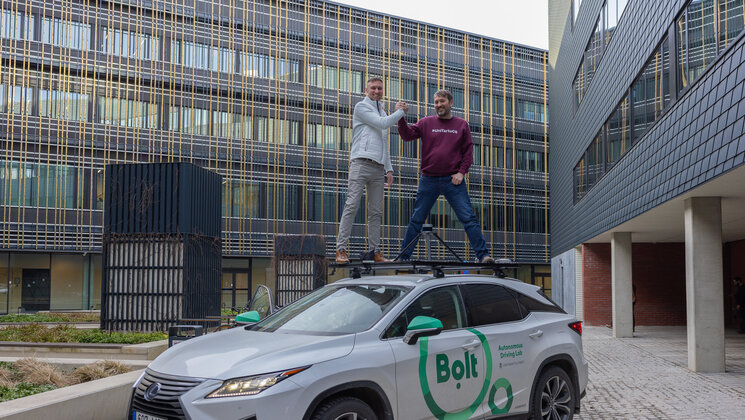Mihkel Tammo: great things happen when people of different backgrounds but similar values work together
The new Head of the University of Tartu Centre for Entrepreneurship and Innovation (EIC) is Mihkel Tammo, a man with a diverse entrepreneurial and leadership background and the former head of the Entrepreneurship and Innovation Centre of Enterprise Estonia (EAS). He started in his new job on 1 April. In an interview with Kadri-Ann Mägi, EIC Community Coordinator, Tammo talked about his journey to the current position and his plans for the future.
Would you tell us about your previous entrepreneurial and leadership experience? Are there any lessons that you carry with you?
I've been involved in leadership and entrepreneurship for nearly ten years. I was quite young, 27, when I started running an industrial company, Estanc. Since then, I’ve been involved in Tammer, another industrial company of our family, both at the level of management and supervisory boards. About five years later, I moved on from running the family business and, as a co-founder and visionary, started the Rohetiiger movement, in which I am a member of the supervisory board. I saw the need to start the sustainability debate in our country, which led me to the EAS, where I led the Entrepreneurship and Innovation Centre – as I do now at the university.
However, I’ve been closely connected with the industrial sector, where I was able to lead various innovations as a manager. I have helped to introduce a culture of employee-centred and supportive leadership in industry and strived to replace a competitive mindset with one that values collaboration. This way, we have reached major industrial partners in Asia and Western Europe.
An important lesson for me as a leader is that it doesn't matter whether you work in the private or public sector, people are people everywhere and always. It is possible to develop their skills, but any attempts to change their character will usually fail. That is why it is so important to work in a collaborative team.
What are your main responsibilities in the new post?
The services provided by EIC are of a very high standard and, naturally, are constantly evolving. We have professionals working on new business, business cooperation and the protection of intellectual property rights. The first keyword I dare mention after such a short time is clarity.
At EIC, we need to very clearly determine the processes that add value to what we do, and think about what value to deliver to which audiences. I feel that our mission and image should be made clear to all beneficiaries. The university is large, and it is difficult for a support unit to find solutions that suit everybody, but EIC also works outside the university. If there is any vagueness in our work, we need to start by removing it.
For example, our stakeholders include the top 100 innovation-oriented companies, SMEs, researchers and PhD students. It would be good if they all knew what we do and why. We need to use plain language and appropriate wording to address a specific target group.
Why did you decide to come to work at the University of Tartu?
There are two reasons.
First, the timing was right. I think it is not enough to do the right thing. You need to do the right thing at the right time. I believe now is the best time to develop research-intensive entrepreneurship and bring different parties together.
Secondly, I like to work with a sense of mission. The position as the head of entrepreneurship at the University of Tartu offers that. There is plenty of novelty and excitement, but there are also many points of contact with my previous experience. Great things happen when people with different backgrounds and skills but similar values come together and work together.
The University of Tartu is undoubtedly a university that is highly valued both in Estonia and abroad and where top-level research is done. Entrepreneurship not only makes it possible to develop a country’s economy but also create new, useful knowledge-based products, services and technologies that move society in the right direction. This is the goal I want to work and strive for.
What principles are the most important for you as a leader?
I’ve always believed that people are not just a resource. This was the attitude around 100 years ago, when scientific management was developed, with a focus on processes and efficiency. Henry Ford, perhaps the most famous representative of this school of thought, asked, “Why is it that every time I ask for a pair of hands, they come with a brain attached?” Already as a novice manager, I felt that Ford’s attitude was wrong and people should be managed based on social and psychological needs. A manager needs to create an environment conducive to growth and development so that the team thrives because only this way can work be an enriching part of our lives.
In the working environment, three essential needs must be met: people must have a sense of inclusion and belonging, autonomy and development. And development does not have to be only about moving up the career ladder, but also about growth as a person and an opportunity for self-realisation.
Now more than ever, I believe that if a manager allows employees to take time to reflect, the goals we have set together will be met. It makes people feel more responsible for their work and see the value of their contribution.
Sustainable development is one of the themes close to your heart. What was it like to talk about the importance of sustainable development as a young manager in the conservative industrial sector?
I started to talk about sustainable development in 2016 to build a competitive advantage for Estanc. Then, it was an insignificant and incomprehensible topic in the eyes of the public, especially for the older generation. I was told that when you look out, there’s nothing wrong. Today, there are not so many opponents any more, although there still are some.
Now, thanks to advocates, the importance of sustainable development has reached the masses. Industry is a conservative sector, but it is central to the country’s economy, as most of Estonia’s exports come from industry. If five years ago you had to say that industry needed to move much faster, now most people understand that it is important and needs to be addressed. So, the accelerator is pressed to the floor now. The adoption of various regulations has helped a lot, and the progress is the fastest in areas where sustainability is driven by market requirements.
What else do you do and consider important?
My family and the leadership job are the most important for me. I also value contributing to society. I try to divide my time between causes I believe in.
In the field of education, I have been giving management and leadership lectures for over five years at EBS and Tallinn University of Technology. In the latter, I am also a member of the advisory board at the School of Business and Governance. I have established the alumni board of Rocca al Mare School and advised the school on various issues.
As an entrepreneur in residence, I have given advice to University of Tartu researchers on their path to research-intensive entrepreneurship. For this reason, probably, I feel good in this new post. I have also been the key coach for green tech companies at Tehnopol for five years, and, in addition, a mentor to the top-level managers of nearly 10 enterprises.
Two years ago, I started TIFC, a family office that allows me to consider myself an investor. More recently, I started as an advisor to 2C Ventures, Estonia’s first green technology fund. This has given me a lot of hands-on experience and contacts with research-intensive companies. It helps me understand the many obstacles that researchers have to overcome when doing business.



